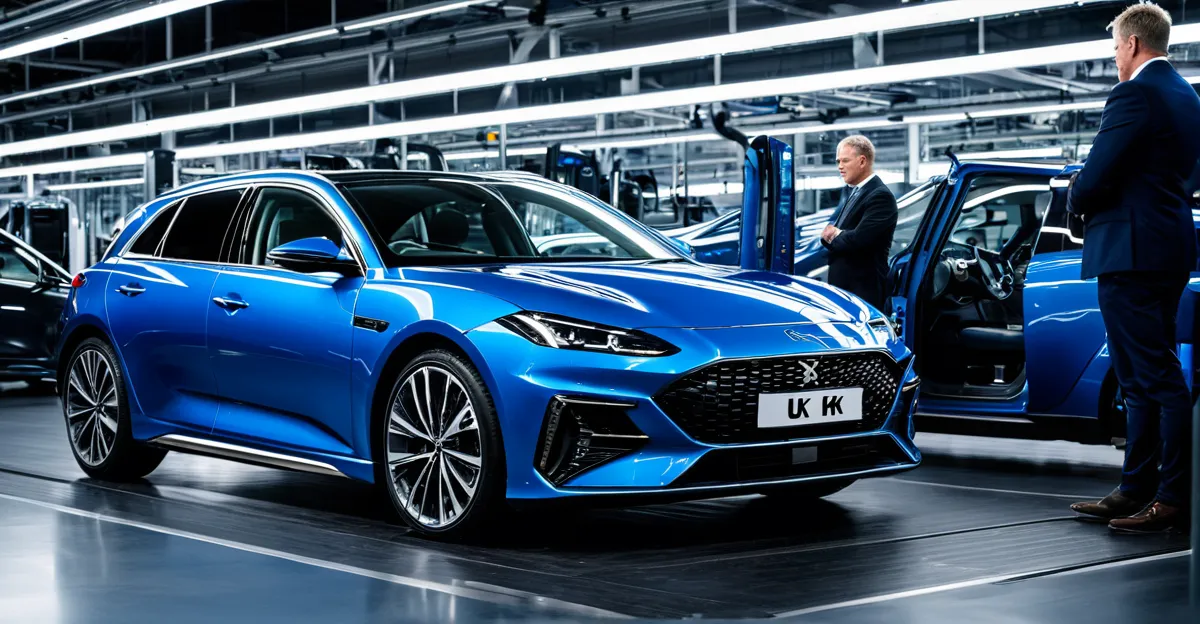Overview of Current Challenges in the UK Automotive Industry
The UK automotive industry is navigating a landscape full of complex challenges. Environmental factors exert considerable pressure on manufacturers, demanding innovations for sustainability. Regulations focusing on cleaner technologies necessitate shifts in production strategies. Compliance with these stringent standards not only affects operational costs but also influences product line innovation and market competitiveness.
Moreover, consumer preferences are evolving rapidly, driven by a combination of lifestyle trends and rising technological awareness. Increasing demand for connected and energy-efficient vehicles pushes the industry towards adopting new technologies. This transformation is seen as both an opportunity for growth and a significant challenge in terms of redesigning existing processes and infrastructure.
Also to read : Title: What Are the Emerging Technologies Shaping the Future of the UK Automotive Industry?
UK manufacturers are also grappling with supply chain disruptions influenced by global events and local economic conditions. Global competitiveness remains a constant pressure, with innovation, quality, and cost efficiencies being critical determinants in maintaining market share. Overcoming these challenges demands a collaborative effort, leveraging technological advances, and policy support to drive the industry forward.
Innovations in Electric Vehicles
The UK automotive sector is witnessing significant strides toward sustainability through electric vehicle innovations. With a focus on advancing battery technology, manufacturers are achieving higher energy efficiency. Improved battery capacities and faster charging times are pivotal in this transformation. Many UK manufacturers are increasingly adopting electric vehicles, driven by these technological advancements.
This might interest you : How are UK automakers addressing supply chain disruptions?
Government incentives play a crucial role in promoting this transition. Various support programs aim to boost production and adoption rates of electric vehicles, making them more accessible to consumers. Moreover, these incentives encourage sustainability initiatives by reducing manufacturing costs and encouraging newer players in the market.
Furthermore, the industry is evolving with collaborative efforts among manufacturers to meet consumer demands. By focusing on energy-efficient technologies and reducing emissions, the UK automotive sector is paving the way for a more sustainable future. This commitment to innovation not only enhances the industry’s global standing but also aligns with stringent environmental regulations, ensuring long-term viability.
Role of Technology in Automotive Innovation
In the rapidly evolving landscape of the UK automotive industry, automotive technology plays a pivotal role in driving forward innovations and maintaining market competitiveness. As manufacturers strive to meet changing consumer demands and regulatory requirements, the integration of advanced tech integration has become essential.
Integration of AI and Machine Learning
The adoption of artificial intelligence (AI) and machine learning is reshaping the way vehicles are designed, manufactured, and operated. AI algorithms enhance vehicle safety features through real-time data processing, while machine learning models optimize performance by learning from vast datasets. This integration advances the capabilities of smart vehicles, enabling features such as predictive maintenance and personalized user experiences.
Development of Autonomous Driving
Efforts in autonomous vehicle development have witnessed significant strides, with UK manufacturers conducting robust testing to ensure safety and reliability. These vehicles utilize a combination of sensors, cameras, and AI to navigate through complex environments, aiming for a future where driverless cars become mainstream. This technology is also subject to stringent regulations and ethical considerations, which are crucial in gaining public trust.
Enhancements in Manufacturing Processes
AI and machine learning are not only transforming the vehicles themselves but also the processes involved in their production. Smart technologies improve production efficiency and quality through automation and predictive analytics. From managing supply chains to optimizing production lines, the seamless integration of these technologies results in a more streamlined and cost-effective manufacturing process, reinforcing the position of UK manufacturers in a competitive market.
Collaboration Between Manufacturers and Tech Companies
In the vibrant landscape of the UK automotive sector, industry partnerships are playing a crucial role in pushing technological boundaries and fostering innovation. It is through automotive tech collaboration that manufacturers and tech companies are able to pool their expertise, thereby accelerating the development of cutting-edge solutions. These collaborations have allowed for significant advancements in R&D initiatives, which are essential in addressing the complex challenges currently faced by the industry.
One exemplary collaboration involves UK manufacturers partnering with technology firms to enhance smart vehicle capabilities. By integrating IoT technology and AI systems, these partnerships have successfully improved vehicle connectivity and autonomy. Such collaborative efforts have also led to shared R&D initiatives that focus on developing sustainable and energy-efficient vehicle technologies, directly contributing to the industry’s goal of reducing carbon emissions.
The impact of these tech partnerships is evident in the speed and capability of innovations entering the market. By leveraging combined resources and expertise, these alliances have significantly cut down development times, enabling faster adoption of new technologies. Ultimately, the synergy created through these collaborations enhances the UK’s position in global automotive markets, ensuring that UK manufacturers remain competitive in an ever-evolving industry.
Government Policies and Support
As the UK automotive industry advances amid evolving challenges, government support plays a vital role in shaping its future. Through comprehensive automotive policies, initiatives are designed to bolster sustainability efforts and support innovation. Key policies include stringent regulations on emissions, encouraging an industry-wide pivot towards cleaner technologies. These frameworks are crucial in aligning the sector’s growth with environmental commitments.
Several funding programs and grants are established to accelerate R&D efforts within the industry. These initiatives provide financial support to manufacturers, enabling them to invest in cutting-edge technologies and infrastructure. A focus on sustainability initiatives and emissions reduction is central to these programs, driving the UK’s transition to more sustainable automotive solutions.
Moving forward, government policies are expected to continue evolving to address emerging trends and technologies. Future policy directions aim to enhance competitiveness while supporting innovation and the adoption of new technologies across the market. These policies not only provide a pathway for growth but also reinforce the industry’s resilience in a globally competitive arena. By supporting the industry with well-designed policies, the government ensures the UK remains at the forefront of automotive innovation.
Global Competitiveness and Market Positioning
In the ever-evolving realm of the global automotive industry, understanding how the UK stacks up against international peers is crucial. Comparatively, the UK’s focus on innovation and sustainability has carved a notable niche for its manufacturers. This strategic emphasis allows UK companies to differentiate their offerings on a competitive stage.
Challenges of international competition include navigating diverse regulatory frameworks and consumer preferences. While the UK excels in certain areas, like the integration of cutting-edge technologies and adherence to stringent environmental standards, it must simultaneously contend with cost pressures and supply chain complexities prevalent in foreign markets.
To bolster its market positioning, the UK automotive sector is steering towards collaborative ventures and leveraging governmental policies that favour technological advancements. Positioning strategies must continue to highlight the UK’s commitment to quality and innovation, ensuring that manufacturers remain resilient in the face of shifting global dynamics. Maintaining a proactive approach in aligning with global trends ensures the sustained growth and leadership of the UK within this competitive landscape.
Future Predictions and Trends
As the UK automotive industry forges ahead into the future, understanding future automotive trends is pivotal. By 2030, the sector is expected to witness dramatic advancements in automotive technologies. Key developments include further integration of AI and autonomous systems, which will revolutionize both consumer experiences and vehicular functionalities. Enhanced connectivity will allow smarter interactions between vehicles and urban infrastructures.
Insight from industry experts suggests a substantial market evolution, characterized by a shift towards personalized mobility solutions. Consumer behavior is predicted to lean heavily towards sustainability and eco-friendly options, aligning with broader environmental commitments. This growing preference will drive manufacturers to focus even more on producing green vehicles.
Moreover, predictions indicate a stronger emphasis on seamless technologies. Expect an uptick in investments aimed at developing predictive maintenance systems and enhanced safety features. The emphasis will be on creating autonomous cars capable of harmoniously integrating into existing traffic systems, ensuring efficiency and reducing accidents.
Industry thought leaders emphasize the importance of keeping abreast with these changes. They highlight that UK manufacturers must adapt proactively to emerging trends. This adaptability will enable them to maintain a competitive edge, ensuring resilience and growth in a rapidly advancing global automotive landscape.



